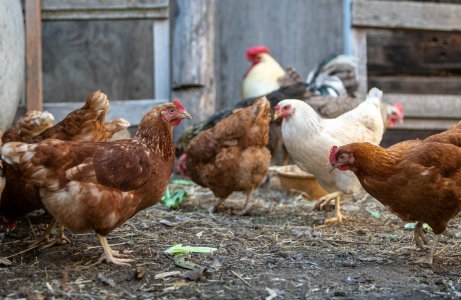Deadly bird flu outbreak in Washington: Is your area next? CDC on high alert!
By
Aubrey Razon
- Replies 0
Washington state's serene farmlands are facing a shocking threat as bird flu makes an unexpected leap to humans!
This alarming development has raised serious concerns and triggered a rapid response from health authorities.
What does this mean for residents, and could the outbreak spread further?
Four agricultural workers in Franklin County, which lies in the heart of Washington's lush eastern half, have tested presumptively positive for avian influenza after exposure to infected poultry at a commercial egg farm.
This unsettling development has prompted a swift response from the Centers for Disease Control and Prevention (CDC), which has deployed a team to the area.
The agency is awaiting specimens for further avian flu testing and is actively supporting the state's efforts to assess the health of workers involved in the containment efforts at the affected poultry facility.
This rapid response is part of a broader strategy to monitor and manage the risks associated with bird flu outbreaks.
Avian influenza, or bird flu, is notorious for causing severe disease and death in birds, particularly domestic poultry.
While it's not uncommon for these outbreaks to lead to the culling of flocks to prevent further spread, human infections are rare and typically result from direct contact with infected animals or contaminated environments.
The Washington State Department of Health has reported that the affected individuals experienced mild symptoms and received antiviral medication as a precaution.
The H5 virus, the strain suspected in these cases, is one of several types of bird flu viruses. It's a reminder that while these viruses are primarily a concern for animal health, they can also pose a risk to humans.
The CDC has stated that there have been 27 reported human cases of the H5 virus in the United States this year, a number that underscores the potential for these viruses to jump species.
While the risk to the general public remains low, the CDC is not taking any chances.
They are closely monitoring the situation and working with state health departments to track individuals with potential animal exposures.
The goal is to contain any potential spread and to ensure that the public is informed and protected.
Here's what you can do to stay informed and prepared:
1. Stay Updated: Follow local news and health department updates for the latest information on the outbreak and any recommended safety measures.
2. Practice Good Hygiene: If you're in contact with birds or live near poultry farms, ensure you're practicing good hygiene, such as washing hands thoroughly and wearing protective gear if necessary.
3. Recognize the Symptoms: Be aware of the symptoms of bird flu in humans, which can range from mild respiratory issues to more severe conditions. If you suspect exposure, seek medical advice promptly.
4. Stay Connected: Talk to your community about the outbreak. Share information and support each other in following health guidelines.
5. Listen to the Experts: Rely on guidance from health authorities like the CDC and the World Health Organization (WHO) for the most accurate and up-to-date information.
Remember, while the current risk to the public is low, staying informed and taking appropriate precautions is key. Let's support our local farmers and health workers as they work to contain this outbreak and keep our communities safe.

Have you or someone you know been affected by the bird flu outbreak? Do you have concerns about how this might impact your community? Share your thoughts and opinions with us in the comments below.
This alarming development has raised serious concerns and triggered a rapid response from health authorities.
What does this mean for residents, and could the outbreak spread further?
Four agricultural workers in Franklin County, which lies in the heart of Washington's lush eastern half, have tested presumptively positive for avian influenza after exposure to infected poultry at a commercial egg farm.
This unsettling development has prompted a swift response from the Centers for Disease Control and Prevention (CDC), which has deployed a team to the area.
The agency is awaiting specimens for further avian flu testing and is actively supporting the state's efforts to assess the health of workers involved in the containment efforts at the affected poultry facility.
This rapid response is part of a broader strategy to monitor and manage the risks associated with bird flu outbreaks.
Avian influenza, or bird flu, is notorious for causing severe disease and death in birds, particularly domestic poultry.
While it's not uncommon for these outbreaks to lead to the culling of flocks to prevent further spread, human infections are rare and typically result from direct contact with infected animals or contaminated environments.
The Washington State Department of Health has reported that the affected individuals experienced mild symptoms and received antiviral medication as a precaution.
The H5 virus, the strain suspected in these cases, is one of several types of bird flu viruses. It's a reminder that while these viruses are primarily a concern for animal health, they can also pose a risk to humans.
The CDC has stated that there have been 27 reported human cases of the H5 virus in the United States this year, a number that underscores the potential for these viruses to jump species.
While the risk to the general public remains low, the CDC is not taking any chances.
They are closely monitoring the situation and working with state health departments to track individuals with potential animal exposures.
The goal is to contain any potential spread and to ensure that the public is informed and protected.
Here's what you can do to stay informed and prepared:
1. Stay Updated: Follow local news and health department updates for the latest information on the outbreak and any recommended safety measures.
2. Practice Good Hygiene: If you're in contact with birds or live near poultry farms, ensure you're practicing good hygiene, such as washing hands thoroughly and wearing protective gear if necessary.
3. Recognize the Symptoms: Be aware of the symptoms of bird flu in humans, which can range from mild respiratory issues to more severe conditions. If you suspect exposure, seek medical advice promptly.
4. Stay Connected: Talk to your community about the outbreak. Share information and support each other in following health guidelines.
5. Listen to the Experts: Rely on guidance from health authorities like the CDC and the World Health Organization (WHO) for the most accurate and up-to-date information.
Remember, while the current risk to the public is low, staying informed and taking appropriate precautions is key. Let's support our local farmers and health workers as they work to contain this outbreak and keep our communities safe.
Key Takeaways
- Four agricultural workers in Washington state have tested presumptively positive for avian influenza after exposure at a commercial egg farm.
- They experienced only mild symptoms and have received antiviral medication, marking the first presumed human cases of H5 virus in Washington state.
- The CDC is involved, awaiting specimens for testing and has deployed a team to assess the health of workers involved in the poultry farm depopulation event.
- While bird flu commonly affects birds, it can infect humans with close contact to infected animals; despite this, the CDC maintains that the current public health risk is low.
Last edited:







